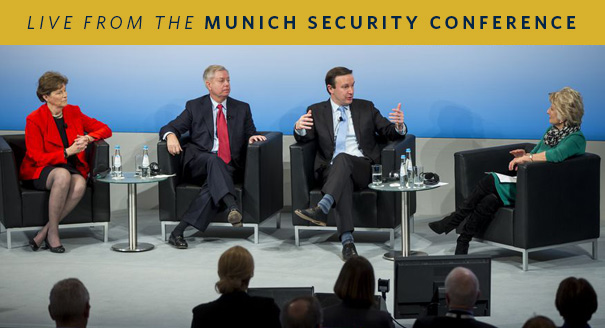A great many words were uttered during this year’s Munich Security Conference about why NATO’s European allies should spend more on defense. Mike Pence, the U.S. vice president, spent the best part of his speech on February 18 berating the Europeans. He mentioned values without once defining them.
Now, on day three of this annual get-together of decisionmakers and defense experts, it took three leading U.S. senators to spell out that the transatlantic relationship was not only about increasing military budgets. It was, they said, also about defending values. In particular, they homed in on what was happening in their own country and how to deal with Russia and Iran.
The senators—Jeanne Shaheen, Lindsey O. Graham, and Christopher Murphy—didn’t hold back in explaining that they were extremely worried about U.S. President Donald Trump’s criticism of the media and attempts to prevent immigrants from seven mainly Muslim countries from entering the United States.
“Here’s the deal [with the media],” said Graham. “We are going to support the press’s ability to do its job. But it needs to have some sense of proportionality. Trump is not the first president to be upset about the press. The press can be a pain in the butt,” he added. Shaheen chipped in. “I’m very worried about the statement by President Trump about the press and overt efforts to manipulate the media in the United States,” she said.
The three senators said they were determined to speak out about defending their country’s values. In what was music to the ears of the Europeans sitting in the banqueting hall in Munich, Shaheen said, “We will do everything to support the EU.”
Murphy, who follows European politics closely, made the point that “if we are serious about the transatlantic connection, we have to say something about values.” He was echoing what German Chancellor Angela Merkel had said the previous day when she framed the transatlantic relationship in the context of shared values, including upholding a free and independent press. Pence was sitting in the front row, listening.
When it came to values and Russia, Graham pulled no punches. Russia, he said, was not going to get away with its alleged interference in U.S. elections. “The Russian dynamic has taken a different turn. Russia is an outright liar,” he said. “On top of the list will be sanctions against Russia. I’m very concerned about Trump not speaking out. We should introduce Russian sanctions for interfering in our [2016 presidential] election. My goal is to put it on Trump’s desk.”
There was agreement all round. Then, in a reference to the upcoming French presidential election, Graham quipped, “To my friends in France, [the Russians] are coming after you. Twenty-seventeen is going to be the year of kicking Russia’s ass.”
Iran wasn’t spared criticisms or warnings, either. The senators lashed out at Tehran’s support for terrorist movements and its system of government. Referring to a previous session, Graham said, “I didn’t believe a word of what [Iranian Foreign Minister Mohammad Javad] Zarif said about not producing nuclear weapons.” Trump, who has been highly critical of the 2014 nuclear deal between Iran and the United States and the other permanent members of the UN Security Council plus Germany and the EU, has also questioned Iran’s intentions to build a nuclear weapon.
The discussion about Iran steered toward values. During the short question-and-answer session, the panel was asked why it was so critical of Iran’s values, which, the questioner said, was a peaceful country and treated its people properly. The panel was having none of it. “The challenge is whether . . . Iran’s support for organizations in Lebanon and Syria and Yemen [represents] the kind of values that Iranians should support,” Shaheen said. “At some point, I hope there will be a free government in Iran,” she added.
This discussion about values in the United States and the way Russia and Iran were running roughshod over them could have gone on for hours. What was interesting about it was that U.S. senators spoke about the crucial need to defend their country’s values, which have an impact on the transatlantic relationship. That was new. It was as if their own country were in the dock.











